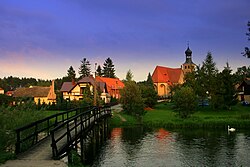Swornegacie
Swornegacie | |
|---|---|
Village | |
 View of Swornegacie with the Brda River in the foreground and the Saint Barbara church in the background | |
| Coordinates: 53°51′36″N 17°29′57″E / 53.86000°N 17.49917°E | |
| Country | |
| Voivodeship | Pomeranian |
| County | Chojnice |
| Gmina | Chojnice |
| First mentioned | 1272 |
| Population | 1,080 |
| Time zone | UTC+1 (CET) |
| • Summer (DST) | UTC+2 (CEST) |
| Vehicle registration | GCH |
Swornegacie [sfɔrnɛˈɡat͡ɕɛ] is a village in the administrative district of Gmina Chojnice, within Chojnice County, Pomeranian Voivodeship, in northern Poland.[1] It lies 19 kilometres (12 mi) north of Chojnice and 93 km (58 mi) south-west of the regional capital Gdańsk. It is located within the historic region of Pomerania.
History
[edit]The oldest known mention of the village comes from a document of Pope Gregory X from 1272. Swornegacie was a royal village of the Polish Crown, administratively located in the Tuchola County in the Pomeranian Voivodeship.[2]
During the German occupation of Poland (World War II), the occupiers carried out expulsions of Poles, who were then mostly deported to forced labour to Germany, while their farms were handed over to German colonists as part of the Lebensraum policy.[3]
Notable people
[edit]- Joachim Joachimczyk (1914–1981), Polish photojournalist, member of the Polish resistance movement during World War II, participant in the Warsaw Uprising.
References
[edit]- ^ "Central Statistical Office (GUS) - TERYT (National Register of Territorial Land Apportionment Journal)" (in Polish). 2008-06-01.
- ^ Biskup, Marian; Tomczak, Andrzej (1955). Mapy województwa pomorskiego w drugiej połowie XVI w. (in Polish). Toruń. p. 124.
{{cite book}}: CS1 maint: location missing publisher (link) - ^ Wardzyńska, Maria (2017). Wysiedlenia ludności polskiej z okupowanych ziem polskich włączonych do III Rzeszy w latach 1939-1945 (in Polish). Warsaw: IPN. pp. 108–109. ISBN 978-83-8098-174-4.

